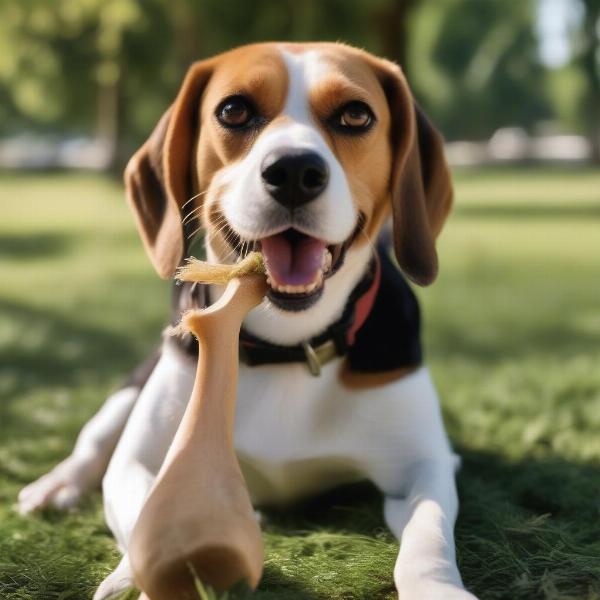Wood chews offer a natural and engaging way to satisfy your dog’s instinct to chew. They provide mental stimulation, help clean teeth, and can even freshen breath. But with so many options available, how do you choose the right wood chew for your furry friend? This guide covers everything you need to know about wood chews for dogs, from safety and benefits to choosing the perfect chew and potential risks.
Why Do Dogs Love Wood Chews?
Chewing is a natural and necessary behavior for dogs. It helps them relieve stress, boredom, and teething discomfort. Wood chews, in particular, offer a satisfyingly firm texture that allows dogs to really sink their teeth in. The act of gnawing on wood also helps scrape away plaque and tartar buildup, promoting dental health. Plus, many wood chews have a naturally appealing aroma that dogs find irresistible.
Choosing the Right Wood Chew for Your Dog
Selecting the appropriate wood chew depends on several factors, including your dog’s size, chewing habits, and any allergies. For aggressive chewers, harder woods like olive wood or coffee wood are recommended. Puppies and senior dogs with weaker teeth might benefit from softer woods like balsa. Always ensure the wood is untreated and free of chemicals, pesticides, and artificial flavors. Avoid woods like cherry, walnut, and yew, as they can be toxic to dogs.
Are Wood Chews Safe for Dogs?
Wood chews are generally safe for dogs when chosen and used correctly. However, there are potential risks to be aware of. Splintering is the primary concern. Always supervise your dog while they are chewing and discard any chews that become excessively worn or start to splinter. Ingestion of large wood splinters can cause digestive upset or even blockages. are coffee wood chews safe for dogs provides more information on the safety aspects of coffee wood chews specifically. If you are considering using coffee wood, this is a must-read resource.
Benefits of Wood Chews for Dogs
Beyond satisfying the natural urge to chew, wood chews offer a range of benefits for your dog’s overall well-being. They can help improve dental hygiene, reduce boredom and anxiety, and provide a healthy outlet for destructive chewing behaviors. tall baby gates for dogs could be helpful if your dog is particularly prone to chewing furniture while you are away.
Dental Health
The abrasive action of chewing on wood helps remove plaque and tartar, contributing to healthier teeth and gums. This can help prevent dental disease and bad breath.
Mental Stimulation
Gnawing on a wood chew provides mental engagement, preventing boredom and reducing the likelihood of destructive chewing habits.
Stress Relief
Chewing is a natural stress reliever for dogs. Providing a safe and appropriate chew toy like wood can help your dog cope with anxiety and stressful situations.
 Dog chewing wood happily
Dog chewing wood happily
What Types of Wood Are Safe for Dogs to Chew?
Several types of wood are considered safe for dogs, including coffee wood and olive wood. coffee wood for dogs discusses the benefits of this particular wood. Olive wood is another popular choice due to its durability and resistance to splintering. You can explore more about olive wood chews on our dedicated page: olive wood dog chews. Always choose wood that is specifically designed for dogs and avoid giving your dog branches or wood scraps from trees in your yard.
Conclusion
Wood chews can be a valuable addition to your dog’s toy collection, providing mental and physical stimulation while promoting dental health. Remember to choose safe, untreated wood, supervise your dog during chewing sessions, and discard any chews that become worn or splintered. By following these guidelines, you can help ensure your dog enjoys the benefits of wood chews safely and responsibly.
FAQ
- Are all wood chews safe for dogs? No, not all wood chews are safe. Avoid woods like cherry, walnut, and yew, which are toxic to dogs.
- How do I choose the right size wood chew for my dog? Choose a size appropriate for your dog’s breed and chewing habits. Larger dogs require larger chews to prevent swallowing.
- Can puppies have wood chews? Yes, puppies can have wood chews, but choose softer woods and supervise them closely.
- What should I do if my dog swallows a wood splinter? Contact your veterinarian immediately if your dog swallows a wood splinter.
- How often should I replace my dog’s wood chew? Replace the wood chew when it becomes excessively worn, splintered, or small enough to be swallowed.
- Are there any alternatives to wood chews? Yes, there are various alternatives, including nylon chews, rubber toys, and edible chews.
- Where can I buy safe wood chews for my dog? Reputable pet stores and online retailers offer a wide selection of safe wood chews for dogs.
ILM Dog is your trusted source for expert advice on all aspects of dog care, from breed selection and puppy care to senior dog health and training. We are dedicated to providing dog owners worldwide with the information and resources they need to raise happy, healthy companions. Our expertise covers a wide range of topics, including dog breeds, health, training, nutrition, grooming, and product recommendations. Contact us today for personalized guidance and support. Email: [email protected] Phone: +44 20-3965-8624 Visit ILM Dog for more information.